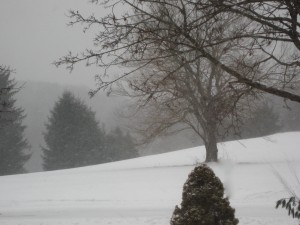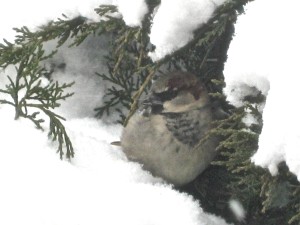
– Photo by Jan Ketchel
The recent weather situation in the Northeast, as we awaited the track that the “snowstorm of the century” would take, reminded me of how we expect the experts, in this case the meteorologists, to get it right and how quick we are to judge them for getting it wrong. I, for one, am always grateful for those experts. I know how rare it is to be able to predict nature with any certainty.
I spent almost a decade living in Louisiana where the specter of hurricanes is real and is taken very seriously. Many a time we packed up our belongings and hoped for the best. Each hurricane’s approach offered a lesson in detachment. What had meaning? In the end, we discovered that very little had value; only our lives and our children’s lives had meaning. In those moments, I understood the challenge that death brought, having to leave everything behind. Hurricane preparation itself presented us with the real truths of nature; death could come at anytime and you are not allowed to take anything with you.
One time we went to the campus of the university where my husband taught. We spent the last critical 24 hours before the hurricane was predicted to strike in the company of others, keeping our children occupied while the parents, most of them other faculty and staff, worriedly watched the news and wondered if we should all move up to the second floor for the night, just in case. We were 30 miles inland, but we knew that meant nothing.
It was a hot August day. Occasionally we’d all step outside, trying to gauge the situation, giving ourselves and our children the experience of what it felt like to be in the path of approaching annihilation. The wind, swirling from the north in a counterclockwise direction, was eerily balmy. The sky darkened, as the dry soil of Southwest Louisiana flew into hair, eyes, nose and mouth. None of us took it lightly.
We’d all heard of the devastation that the Louisiana coastal area had been through in the past, how most of the towns south of us had been totally wiped out in Hurricane Camille in 1969, causing catastrophic damage and major loss of life. Bodies of the dead had been found 50 miles away from where they’d lived, washed inland by the surging seas.
In Louisiana they don’t take hurricanes lightly. Every family, it seems, has a hurricane story. My daughter has been living in New Orleans for the past 3 years, and she says that each year as hurricane season approaches a certain tension arises. If a hurricane has not hit in a while people get suspicious, expect the “big one,” as happened in 2005. First Katrina hit New Orleans and then Rita hit Southwest Louisiana, our old hometown.
My daughter experienced Hurricane Isaac a few months after her move to New Orleans in 2012. She and her roommates hunkered down for three days while the winds howled, windows shattered, part of the roof blew off the house they were renting and the shed in the backyard blew away. She has stayed on, but her two friends couldn’t handle the tension that exists in a land so vulnerable; within 6 months they were back in New York.

– Photo by Chuck Ketchel
We, in the Hudson Valley, fared well the other day. And just as that day in Louisiana when we waited in the tension of the impending storm, which struck 50 miles to the east of us, so too this winter storm, Juno, struck to the east of us as well. In both cases, other people did not fare so well. In both cases, lives were lost and people suffered. Compassion is naturally stirred, as naturally as fear of impending disaster is stirred.
Nature does as nature does. There is really no predicting it exactly. Many a hurricane has gone out to sea only to turn back inland and strike again. Living in Louisiana, I heard many such stories, how people were caught off guard, thinking they were safe. Nature is truly unpredictable. And so I respect nature and those who seek to warn us of its changing nature. Even if I am safe, if my loved ones are safe, there are others who are suffering. Lessons in compassion are easy to experience in the everyday events of being human on this planet we all share.
And so I shovel my snow, grateful that it is only about 8 inches deep. I send love and good thoughts to my brother, on the coast north of Boston, shoveling the 30 inches he got, and to another brother on Cape Cod, likewise digging out from the snowstorm of the century.
Be safe in nature; be compassionate in your own nature,
Jan
